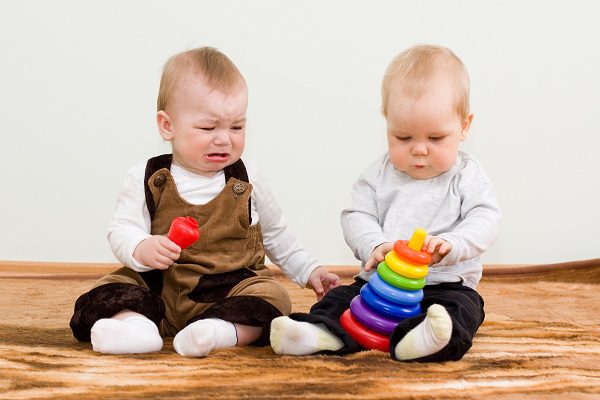Teaching kids to share: Top tips to avoid tears
We all want our children to be caring and sharing kinds of kids, but learning to share is an acquired skill that doesn’t always come naturally.
Kids First’s child psychologists tell us that while it’s natural to want our children to be generous, kind and cooperative, very young children are by nature self-centred.
They tend to want things like food, toys and attention all to themselves and it takes several years for them to develop the maturity they need to take other people’s feelings into account.
Not sharing doesn’t always equal selfishness
Children who refuse to share are not always being deliberately selfish.
It’s normal for children to become attached to special toys that are familiar and symbolise security.
When parents demand that their child share their special possessions immediately they sometimes don’t realise that they are interrupting important play and forcing their child to surrender something that makes them feel safe and secure.
The role of parents
Teaching children under the age of 10 to play cooperatively can be a challenge for parents.
Sharing is a difficult concept to teach to competitive siblings, but instead of labelling children as greedy or selfish, you can model good communication skills by giving your child the choice to share or not.
Parents who frequently step in to resolve their children’s disputes deny them the opportunity to learn how to problem solve.
As soon as a parent is drawn into the conflict, the risk of unintentionally conveying a preference for one child over another increases, and this only makes things worse.
Sharing rules that work
To avoid sharing dramas, simple rules are usually best.
Rules that reinforce respect and responsibility can be understood by children from the age of three.
Kids need these kinds of social language skills if they are to make friends and get along happily with their peers.
3 Rules for successful sharing
- If you want something that belongs to someone else, you must ask first
When your children go out to visit a friend, it’s important to teach them not to grab for toys that belong to another child.
The ability to ask or wait until a toy is offered is a basic play skill that all children need to develop before they go to school.
This rule also gives children security because, when they have friends over to play, they can relax knowing that their parents will gently defend their possessions with language like “at our house, we ask each other before playing with something that belongs to someone else”
By using these assertive but fair communication tools, you can provide a good model for your children.
- When someone asks to use your things, you can’t simply say ‘no’
Children don’t have to automatically say ‘yes’ when another child wants to intrude upon their play, but if they refuse to share, they need to respect the other child enough to either give a reason, or suggest an alternative.
Suggestions like “let’s take turns”, “you can play with it, but only inside” or “that’s my new toy and it’s special, but you can play with any of these” offer options for kids who are not yet ready to hand over their special toy.
By teaching your children this rule, you are encouraging your kids to be logical and reasonable in their interactions with both their peers and their siblings.
- Share the toy fairly, or it will go into time out
Sometimes kids need a bit of help to play and share.
Although parents shouldn’t get too involved, providing a clock or timer can establish a system for the equitable use of a toy.
This is a particularly useful strategy for children aged under 7 whose responses to visual cues are often better than their ability to process verbal instructions.
When all else fails and he conflict can’t be resolved, place the toy into time out and re-direct the children to another activity.
Eventually they will learn that, unless they play cooperatively, they will lose the ability to play with toys of their choosing.
Special toys that aren’t for sharing
While sharing is important, kids also need to feel that there are some special toys that are just for them and that it is okay for them not to share toys that are particularly important or meaningful to them.
Notice positive behaviour more often
As a busy parents, your attention is probably often drawn to conflicts and negative behaviour, however by praising your children’s positive behaviour, you can help your kids to share more often.
The best thing that you can do is notice when your children are doing the right thing.
When your child shares well and you give specific praise like “well done, you shared your toy with your brother in a friendly way”, your kds will be encouraged to repeat that behaviour in the future.
When it comes to sharing, children learn more from what we do than from what we say.
Whatever sharing strategies you choose, make sure that your kids are learning about equity, a fair go and the perspective of others.
Children who have these skills make popular playmates and are rarely short of a playground pal.
© 2017 Sonja Walker
Kids First Children’s Services
Need help to manage your children’s behaviour?
Kids First’s experienced psychologists are not only professionals who have supported hundreds of children, but they’re also parents themselves, and so they ‘get’ the pressures that families face.
Contact us by phone on (02) 9938 5419 or send us a note in the comments box below. We’d love to help you and your children find the way forward




